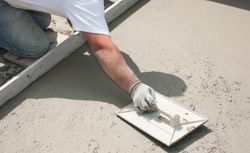
Whether you’re laying down a new driveway or installing a patio, ready-mix concrete is a great option. This material is known for its durability, provided the installation is handled correctly. To ensure your project will go off without a hitch, review the following frequently asked questions.
Common Questions About Ready-Mix Concrete
What is concrete made of?
Concrete contains cement, air, water, and aggregates, such as gravel and sand. Cement is the binding material that holds the other ingredients in place. Water influences concrete strength, with more water weakening the mix, while small air bubbles ensure the water has room to expand to prevent cracking. Finally, aggregates keep the concrete sturdy and prevent larger air pockets from developing.
Why does concrete need to cure?
Curing is another name for concrete hardening, which is an essential aspect of proper installation. Water and cement react chemically, which allows the cement to harden and bond with other materials in the mix.
 For proper curing to occur, the right amount of water must be added, the temperature must be correct, and enough time must elapse before the concrete is tested. In general, you can walk on concrete after 24 hours and drive a passenger vehicle on it after 48. Heavy machinery should not be allowed on newly installed concrete for at least one month.
For proper curing to occur, the right amount of water must be added, the temperature must be correct, and enough time must elapse before the concrete is tested. In general, you can walk on concrete after 24 hours and drive a passenger vehicle on it after 48. Heavy machinery should not be allowed on newly installed concrete for at least one month.
Can you install concrete in cold weather?
If concrete freezes within the first 24 hours of installation, it'll lose much of its strength. However, there are a few solutions at your disposal. For example, heating the water or aggregates in the mix can help concrete maintain the proper temperature to cure correctly. You can also increase the cement content or use an admixture, which speeds up the chemical reaction between the cement and water.
Why does concrete develop cracks?
Adding more water to concrete decreases its strength and can lead to cracking. Excess moisture will expand and shrink as temperatures fluctuate, which can cause cracks to form. Additionally, rapid curing can cause issues. Once again, the problem is excess moisture—the more water in the concrete mix, the quicker it'll evaporate.
Luckily, adding control joints, which are pre-planned cracks that accommodate expansion and shrinkage, can prevent cracking.
Working with a trusted ready-mix concrete supplier ensures your next project will be a success. Since 1920, The Dolomite Group has provided quality supplies to businesses, contractors, and DIYers throughout Rochester, NY. Their experience allows them to guide customers in the right direction if they’re unsure of the best product to buy. Visit their website to learn more about their products, or call (585) 381-7010 to discuss your needs today.
About the Business
Have a question? Ask the experts!
Send your question

